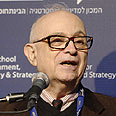

Professor Yehezkel Dror, the founding president of the Jewish People Policy Planning Institute (JPPPI), offered a somber take on relations between Israel and Diaspora Jewry at the Herzliya Conference Wednesday, all the while pointing the finger of blame at Israel’s leadership for the growing rift between the two.
Dror pointed out that Israel-Diaspora relations are not infallible, and that there is a growing rift between world Jewry and the State of Israel. By and by, there is a marked wearing away of Jewish identity among Jewish youths in the Diaspora. There are several key reasons for both of these trends according to Prof. Dror:
2. A growing negation of the notion of a ‘national homeland’ , especially among American youths, coupled with a growing acceptance of an ‘Israeli’, rather than ‘Jewish’, identity among secular youths in Israel.
3. The inherently dissimilar socio-economic makeup of Israeli society versus world Jewry.
4. The distinct political frameworks of sovereign state (Israel) versus distinct, homogenous, voluntarily constructed communities.
5. A gradual decline in the perception of Israel as a safe-haven and as a friend and ally to take pride in.
6. Israel increasingly seen as culpable for anti-Semitic attacks on Diaspora Jews.
7. Religious Diaspora youths are disappointed by the extent to which Israel is a religious “Jewish “ state, where as secular youths are vexed by what they view as the prominent role that religious institutions play in Israel.
8. Where as for the elder generation the experience of resurrecting a Jewish nation on its own homeland after the Holocaust was a vivid and emotional experience, for the young generation it is mere ancient historical fact.

What can we therefore do in wake of these findings and how can this alarming trend be reversed? Professor Dror offers a few recommendations:
1. Israel must begin to consider the impact of its actions on the totality of the Jewish people before instituting any measures.
2. Israel must also consult with prominent world Jewish leaders before taking any steps that have a marked impact on the nation as a whole (future of Jerusalem, the ‘who is a Jew’ dilemma, etc...)
3. Stressing Jewish studies and Jewish history studies in Diaspora schools, as well as highlighting topics of Jewish interest in the media.
4. Cultivating a deeper understanding of the Jewish Diaspora and its unique needs among Israel’s elite, which, notes Professor Dror, is markedly ignorant concerning the leadership of the Jewish Diaspora as well as concerning important events that impact world Jewry.
5. Developing a coherent policy concerning Israelis living abroad, which serve as an important link between Israel and the Diaspora.
6. Strengthening the status of Jerusalem as the heart of Jewish civilization.
Dror also noted that a special government office ought to be established to administer Diaspora Jewry, which, he pointed out, “is currently under the supervision of the Foreign Ministry as if they are a foreign entity to the State of Israel instead of its own flesh and blood.”
There is no ignoring the fact, concluded the professor, that at the heart of the rift between Israel and Jewish communities abroad lies the notion that Diaspora youth have a negative views of Israel politically, nationally and socially.
“We must abandon the view that the bond with Israel is eternal and infallible,” he warned.















